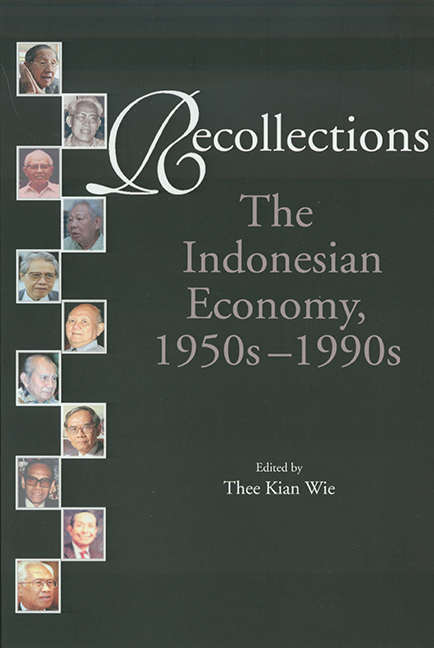Book contents
- Frontmatter
- Dedication
- Contents
- Foreword
- Preface
- Acknowledgments
- Introduction
- II Recollections
- 1 Sumitro Djojohadikusumo
- 2 Mohammad Saubari
- 3 Sjafruddin Prawiranegara
- 4 Abdoel Raoef Soehoed
- 5 Sarbini Sumawinata
- 6 Mohammad Sadli
- 7 Soedarpo Sastrosatomo
- 8 Suhadi Mangkusuwondo
- 9 Emil Salim
- 10 Subroto
- 11 Teuku Mohamad Daud
- Index
- About the Editor
5 - Sarbini Sumawinata
from II - Recollections
Published online by Cambridge University Press: 21 October 2015
- Frontmatter
- Dedication
- Contents
- Foreword
- Preface
- Acknowledgments
- Introduction
- II Recollections
- 1 Sumitro Djojohadikusumo
- 2 Mohammad Saubari
- 3 Sjafruddin Prawiranegara
- 4 Abdoel Raoef Soehoed
- 5 Sarbini Sumawinata
- 6 Mohammad Sadli
- 7 Soedarpo Sastrosatomo
- 8 Suhadi Mangkusuwondo
- 9 Emil Salim
- 10 Subroto
- 11 Teuku Mohamad Daud
- Index
- About the Editor
Summary
EARLY LIFE AND EDUCATION
I was born in Madiun, where I received my primary and junior high school education. On graduation from senior high school (Algemene Middelbare School, AMS) in Yogyakarta, I enrolled in civil engineering at the School of Engineering (Technische Hogeschool, TH) in Bandung. However, not long afterwards the Japanese occupied Indonesia, and I and most other Indonesian students dropped out of the TH, reluctant to study at what had become a Japanese-sponsored institute.
Convinced that the Japanese occupation would only be temporary, we set up an informal study group to prepare ourselves for independence. The group included some former cadets from the Dutch Military Academy in Bandung, including Nasution. As most of us were engineering students, each prepared himself to be proficient in a particular field of engineering. Wiweko, who later became the director-general of the national airline company, Garuda Indonesia, decided to study the iron and steel industry. I chose to work on economic planning, an area I had become interested in after reading an article in a Dutch engineering journal about the Gosplan (central planning) in the Soviet Union. I knew nothing about economics at the time, but I had developed some ideas about this subject.
I had a very happy family life, although we were from a lower middle- class family. My father was a technician at the Office of Public Works in Madiun. Growing up in Madiun, I became aware of Dutch colonial rule at an early age, and of the existence of social differences between us and the Dutch. We were also aware of Sukarno and his campaign for freedom, and became nationalists even in our early teens. In fact, there was already an atmosphere of revolt at that time.
During the revolution I went to Yogyakarta to resume my engineering studies at a Technical Institute which was later to become the Faculty of Engineering of Gadjah Mada University. I had decided to switch from civil to mechanical engineering, but unfortunately there were no mechanical engineers on the faculty, so I was stalled in my study, while others, including Sadli, were able to graduate as civil engineers.
- Type
- Chapter
- Information
- RecollectionsThe Indonesian Economy, 1950s–1990s, pp. 103 - 118Publisher: ISEAS–Yusof Ishak InstitutePrint publication year: 2003

